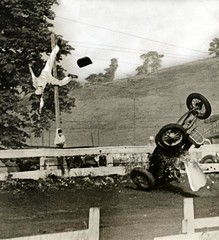I think the same problem happens with local or regional news outlets, whether it be radio or print. Yes, it's probably pretty hard for these outlets to compete with international news organizations in providing detailed coverage of international events. Thus, they concentrate on "local news." The problem as I see it is that they, like the Chambers of Commerce described above, really want me to care deeply about folks within a 90 mile region of my home, but practically draw a line in the sand at that border. They stress the importance of international news by telling me how it affects people within 90 miles of my home.
Case in point. I remember during American involvement in the Bosnia War, it seemed as though there were more coverage of local residents returning as soldiers from the war than the causes and effects of the war itself. It's like, "You should care about Bosnia, because someone 90 miles away from you had to go fight in it." (Frankly speaking, if the guy lived on the other side of the river from me, what makes him so special? I cared about that war because humans had to fight and because humans suffered in it, not because of its effects on inhabitants of some artificial boundary drawn at the subscriber base of the paper.)
A baseball player had a drug scandal. The front page of my local paper had headlines: local fans react! The lifestyle section had a long article about how someone born 90 miles from my house had worked with some of the music business' hottest stars! My public radio station's news reporting seemed to follow the same ambulance chasing-- it's important because it affected someone in our region.
To a similar degree, the same thing happened with NBC's coverage of women's Olympic volleyball matches. NBC showed us every single instance of the American ladies' touching their hair, but we barely saw the faces of the international women they played against.
I tried to express the problem in graphical form below. I'm guessing the average Joe has more concern for his family than for the huddled masses of faraway countries, with concern dropping off steadily as the persons become more distant. I myself probably have a twisted sense of interest, in that my geographical patriotism stops at the borders of my school district, but I have a great concern for the poor of the planet. The local and regional news outlets, however, have a degree of coverage that doesn't match either of our interest curves. That is why I believe they are financially in trouble. I've not noticed when my local paper subscription expired, I've lost interest in supporting the news programs of local public radio.

Don't get me wrong. I deeply care about what happens to the country, I want it to prosper. But my interest-curve is that I want the country to do right and be well because of the effect it has on my family and the huddled masses of the planet, NOT exclusively because of the effect it has on folks 90 miles away from me. I think the long term economic and security interest of my nation, my family, and those 90 miles away from me lies in the overall degree of misery on the planet. Stated another way, I find that a lifeboat philosophy to be not only immoral but ultimately self-defeating in terms of seeking self-interest.
Regardless of your political views about "the market", ultimately businesses have to meet the demands of the market, or die. I propose that there is a disconnect between the coverage focus of local media and the actual interests of consumers. I wonder if the coverage model they've adopted has to do with following the wrong-headed advice of "focus groups" rather than common sense.
Here's my proposal for their success. The local media outlets may continue to send out reporters only within their traditional 90-mile radius. But they have to change the approach to their coverage completely. Instead of reporting on how local residents have been affected by or played a hand in international events, they need to show how local events have an international impact. Imagine if you were to take an American history professor from China, a French labor activist, and an African manufacturer, and sent them to rural upstate New York. Tell them that they have to fill up an hour (or a few pages ) of copy on things that happened in that little town on that day that would be of interest to the world. That is a paper I'd surely miss if my subscription were to run out.
Think globally, report locally, is my proposal for newspaper success.
ADDENDUM (04/02):
The reporting in my local paper underscored this problem all the more poignantly recently. There was a special election for a seat in the U.S. House of Representatives in New York's 20th congressional district. The district is an unusually long and twisted one-- you should click on that link to see the map. Anyway, the district apparently covers one county in the readership of my local paper, and many other counties. The paper had an in-depth story comparing the voting results in this election versus the 2008 one. They showed us how, on a town by town basis, the results were different. The only problem was that they ignored all the counties of the 20th district but their own! They seemed to think we were only interested in our own county! If you really wanted to understand the voting demographics as it would have an effect on the representation in congress, I think you'd want to know how all the towns in the district voted. But, no, the local paper's interest stopped at its circulation boundaries. I cannot imagine how many people would have an interest-cliff that would coincide with the paper: either they don't care about towns other than their own, or they might care about a region larger than the congressional district. That is why local papers are dying.



